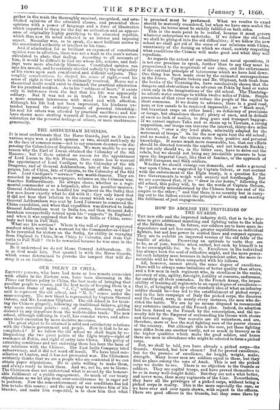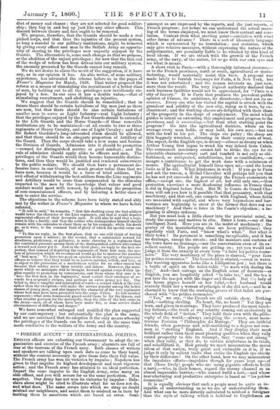HOW TO ABOLISH THE PRIVILEGES OF THE GUARDS.
TIIE new rifle and the improved infantry drill, that is to be, pro- mise to give additional marching and fighting value to the whole of the British Army. In future, our soldiers are to have more in- dependence and not less concert, greater capabilities as individual fighters, but not less power in serried lines and compact squares. They are to exhibit an improved version of the old fable of the bundle of sticks. Preserving an aptitude to unite they are to be, as of yore, terrible when united, but each by himself is to be no contemptible foe. So be it. Excellence in the individual has always been the soul of collective might, and the more power- ful each Infantry man becomes in independent order, the more ir- resistible will he be when compacted with his fellows.
All, however, cannot attain the same degree of excellence. There will be always some battalions of better quality than others, and a few men in each regiment who, in steadiness in the ranks, accuracy of aim, agility, foresight, fertility of resource, endurance, far outstrip all their comrades. In the }reach Army, the impos- sibility of training all regiments to an equal degree of excellence— that is, of bringing all up to the standard idea of what an infantry soldier should be—has led to the establishment of picked corps ; and in the late campaign of Italy the picked corps, the Zouaves and the Guard, were, in nearly every instance, the men who de- cided the battle. We are by no means disposed to recommend any extensive imitation of the French plan. Indeed, its adoption has been forced on the French by the conscription, and the ne- cessity felt by the Emperor of surrounding his throne with choice and favoured troops. Our recruits are all volunteers, and are, therefore, more or less the real fighting men of the poorer classes of the country. But although this is the case, yet these fighting men differ from one another vastly-, not so much in bravery as in the higher qualities which make the good soldier, and hence there are men in abundance who might be selected to form a picked corps.
But, we shall be told, you have already a picked corps—the Guards. Granted, but how chosen ? Not for proved excellence, but for the promise of excellence, for height, weight, make, strength. Many lesser men are soldiers equal to these, but they find, no place among the sons of Anak. This is not the picked corps we desire to see. There is no objection to the Guards as soldiers. They are capital troops, and have proved themselves to be so in many well-fought fields. But they are not a whit better, and never were, than many regiments of the Line. Nevertheless, they have all the privileges of a picked corps, without being a picked corps in reality. This is the more especially the case, as we have over and over again shown, with regard to the officers. There are good officers in the Guards, but they come there by
dint of money and chance ; they are not selected for good soldier- ship ; they buy in and buy up just like any other officers. This discord between theory and fact ought to be removed. We propose, therefore that the Guards should be made a real picked corps, and that thus the injustice of the present system, so long a scandal to our military institutions, might be removed by giving every officer and man in the British Army an opportu- nity of sharing in the privileges now unjustly enjoyed by the Guards. The alternative is, some such change as that we propose, or the abolition of the unjust raivileges ; for now that the thin end of the wedge of reform has been driven into our military system, the anomaly presented by the Guards cannot long remain. We do not desire to claim the merit of the suggestion, if it have any, as in our opinion it has. An able writer, of some military experience has advocated the scheme before us in the pages of Fraser's :Magazine for March, 1858. That writer proposed the reform as a means of stimulating the recruitment of a better class of men, by holding out to all the privileges now invidiously en- joyed by a few. In our eyes it has a double value,—that of stimulating recruitment, and abolishing an injustice.
We suggest that the Guards should be remodelled ; that in future there should be certain battalions of big men just as there are now, but that there should be also certain battalions of smaller men to serve as Light Infantry—real Light Infantry ; that the privileges enjoyed by the Foot Guards should be extended to the Life Guards and the Horse Guards—if those venerable institutions are to be maintained—at all events to two or three regiments of Heavy Cavalry, and one of Light Cavalry ; and that Sir Robert Gardiner's long-advocated claim should be allowed, and that there should be an adequate proportion of Artillery of the Guard. Then the corps should take a new name and become the Division of Guards. Admission into it should be promotion —reward for distinguished service or good conduct ; and the rule of admission should apply alike to officers and men. The privileges of the Guards would then become honourable distinc- tions, and thus they would be justified and rendered subservient to the public welfare. We should then have a permanent de- fensive force in our Guards, of much greater value than that we have now' because it would be a force- of tried soldiers. The evil effect of withdrawing the best soldiers from the Line regiments and Artillery would be more than compensated in the stimulus imparted to the men by the knowledge that valour and good conduct would meet with reward, by quickening the promotion of non-commissioned officers, and by inducing a better class of men to enter the service.
The objections to the scheme have been fairly stated and ably met by the writer in Fraser's Magazine to whom we have before referred. •
"It will be said," he remarks,. "that this drafting away the best soldiers would lower the character of the Line regiments, and that it would deprive regimental officers of their favourite men. It will also be said that a regi- ment is like a family, and that the soldier who distinguishes himself should remain with his comrades to cheer them on by his example, while his deeds go, as it were, to the common fund of glory of which his special corps can kast.
"To this we reply, in the first place, that no one will think of forcing promotion upon a soldier ; in the second, that a substantial reward for steadiness, proficiency, or gallantry, is more cheering to a regiment than the continued presence among them of the distinguished soldiers who earned a reward and never got it. And in the third place, we reply to the first ob- jection, that instead of depriving the regiments of their best men, the sys- tem of promotion which we recommend would go far to increase the number of best men.' We have too good an opinion of the majority of regimental officers to believe that they would be so narrow-minded, selfish, anhazy, as to object to the promotion of a meritorious soldier for no other reason but because that soldier saves them trouble and labour. However, the argu- ment which we anticipate will be brought forward against corps d'elite ap- plies equally to promotion, by commissions, and those whose first care is to keeu the best men in the regiments,' must curtail their catalogue of re- wards to-a sergeant's stripes, and perhaps an extra penny per day. Our belief is, that a tangible and substantial reward—a reward which is the rule rather than the exception—will make the service popular among the better dames of young men, and also improve the character of the very regiments whose best men have been promoted into the corps d'elite. ro add another argument—what more honourable guard could there be for the Queen, and what steadier garrison for the metropolis, than the elite of the best corps in the Army—men, all of whom have been under fire, or done service under circumstances of difficulty and danger."
We have somewhat enlarged and modified the plan suggested by our contemporary ; but substantially the plan is the same, and we are convinced that its adoption is the only means whereby the privileges of the Guards can be saved, and at the same time made conducive to the welfare of the Army and the country.



























 Previous page
Previous page